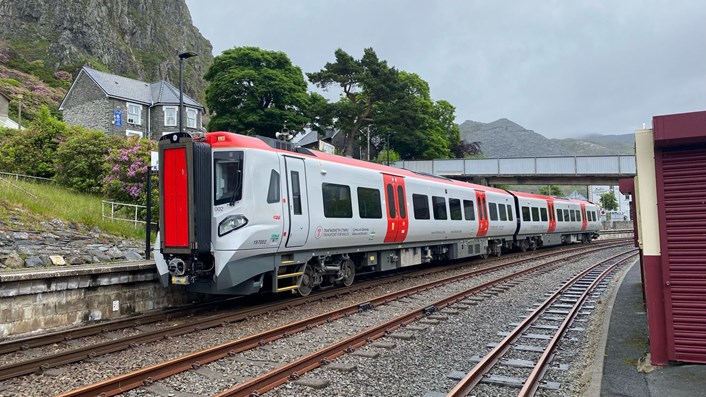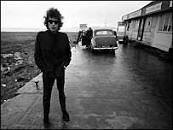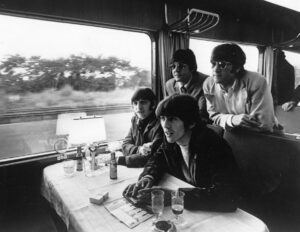
New Transport for Wales train
There is a famous image, taken in 1966, of Bob Dylan waiting for the Aust Ferry on the Severn Estuary, in the shadow of the still unfinished Severn Bridge.
Dylan was already a big star – it was just after he switched to the acoustic guitar. Barry Feinstein photographed him during his tour of the UK on his way to a concert in Wales. And why wouldn’t he travel by car, on roads still relatively free-flowing? (The Beatles were probably the last musical heavyweights to travel extensively on trains.)

Bob Dylan at the Aust Ferry, 1966. Photo: Barry Feinstein
Stars by car
Almost 60 years on, the self-fulfilling truth that stars and many of their fans travel to concerts by road (or air) is finally challenged by what ought to become an equally iconic photo. It’s the slightly blurry image of Chris Martin, lead singer of Coldplay, standing on Cardiff Central Station.
Martin’s net worth is put at £160m, so the high-end limo option was available. Or he could easily have followed the example of the Prime Minister and come by helicopter or, as the singer Beyonce had done for a Cardiff concert the previous week, private jet.
Instead he had taken the train from Manchester for the two Coldplay concerts in the Principality Stadium on June 6 and 7.
Behaviour change
Martin’s example could be more of a spur to behaviour change among ticket holders to big events than any number of railway publicity posters and social media exhortations to people to switch from the car.
Big events at the Principality Stadium in Cardiff inevitably lead to, often extreme, congestion on the M4, particularly on the two lane stretch at Newport. Jams can extend back over the, now, two Severn bridges as far as Bristol. But the conventional solution, build a new road, is not an option here.
The current Labour administration in the Welsh Parliament has ruled out spending £2 billion on a relief road. (Wales has devolved powers over transport and roads.) So other ways must be found to deliver tens of thousands of people to concerts and sports fixtures to the centre of Cardiff, without causing such severe road delays that many of them don’t even arrive in time.
The train is the only feasible answer. Cardiff Central station is less than a quarter of a mile from the venue. It’s already well used. But still far too many ticket holders default to the car, because it’s convenient, it’s what they always do and they’ll take their chance, and join the social media storm of exasperation and outage later.
Enter the influencer

Singer Chris Martin in Cardiff
The story of Martin’s trip to perform at the band’s two sold out shows went as far as the Daily Mail. Martin and Coldplay had already committed to make their tours low carbon, eschewing flights, for this tour. They are applying renewable solutions in their performances, such as creating energy through a dance floor that generates electricity when fans jump up and down, and through pedal power at the venues.
The press understandably focused on the wonder of it. “The singer, 46, stunned fellow passengers when they saw him step off the train and onto the platform in the Welsh capital” marvelled the Mail.
Publicity coup?
Is this the publicity coup public transport needed? Regulars know, as I know from my experience of the M4, that any road journey from the east on a weekend, holiday or big event day is to be avoided. The train service is not the perfect solution. It is adequate, if inflexible. There were, for example, no late trains to Birmingham or North Wales after the Coldplay concerts, which finished late (as concerts generally do). And the perception of many is that fares are too expensive.
Solving the problem of the M4 is in its early stages. But a solution there will have to be, as the prospect of a new road being built by a future administration in Wales recedes, reinforced by the growing and urgent imperative to reduce Co2 emissions. And it’s glaringly obvious that making more use of the existing railway will be the biggest part of it. To have that endorsed by one of the UK’s biggest pop stars is a useful start.

The Beatles were frequent train travellers. Photo: Getty Images
